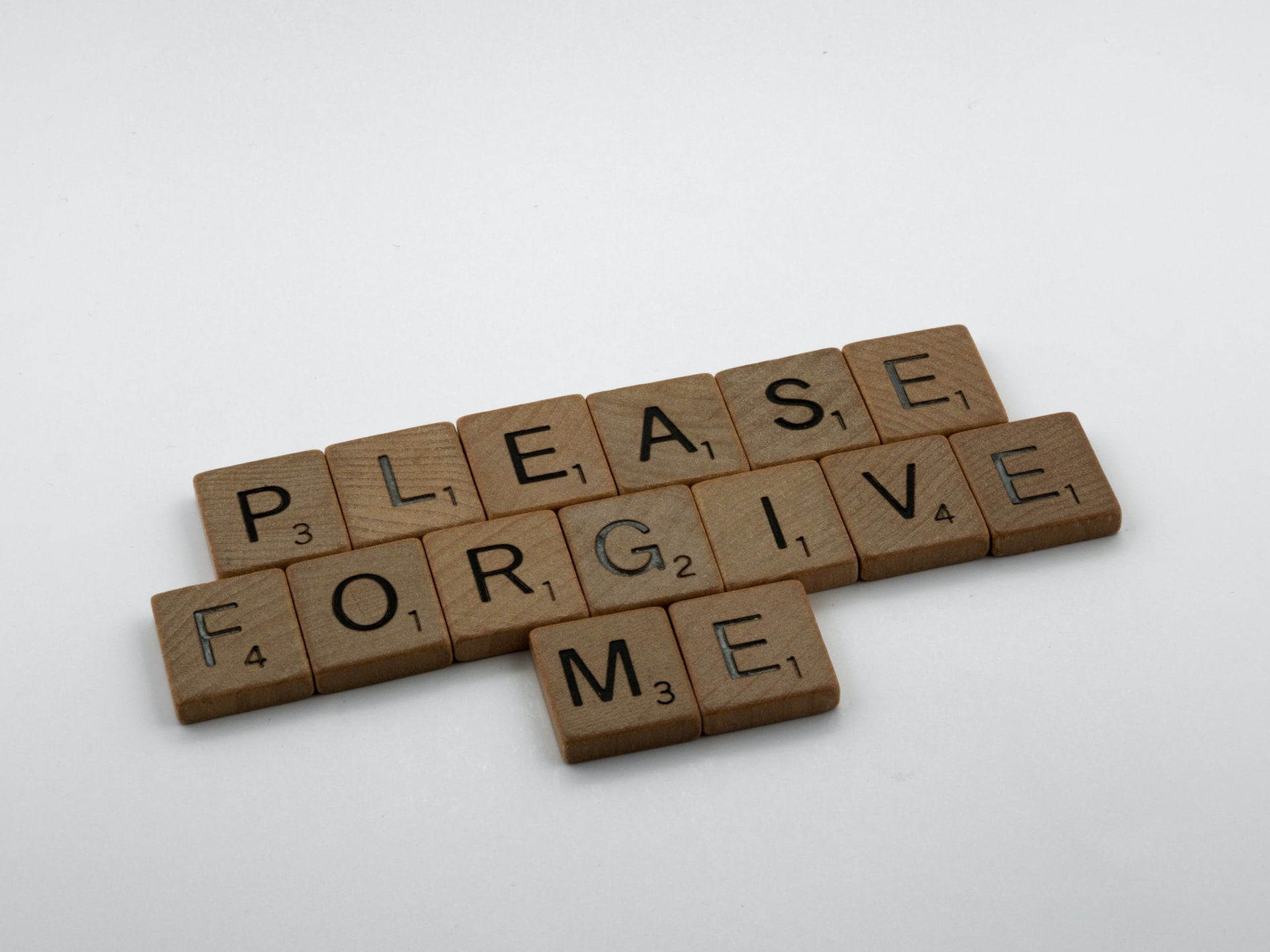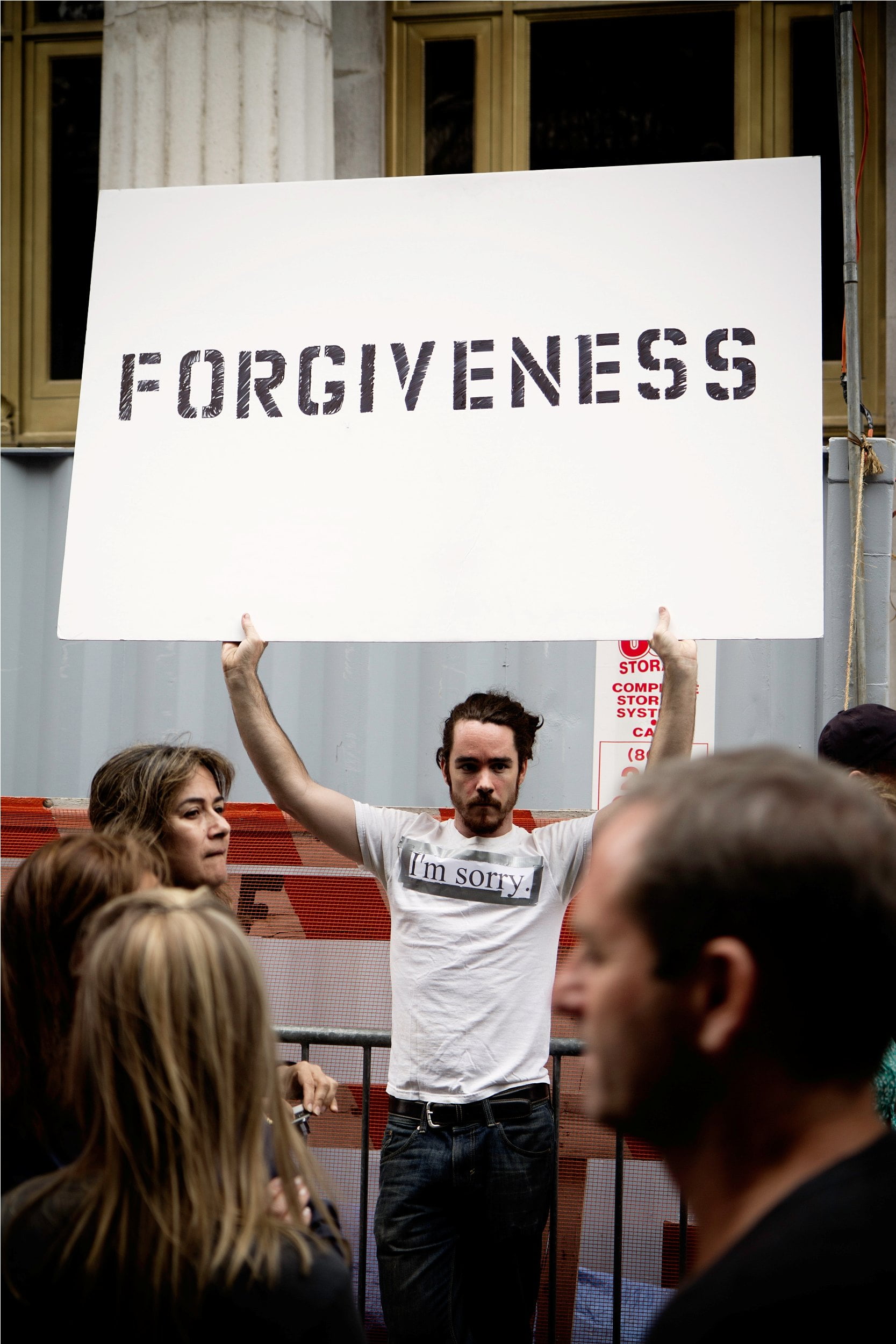In every relationship, be it at work or in your personal life, there comes a time when things go wrong. Promises are made and they aren’t kept, thoughtless actions happen, or words are spoken that should not have been. When that happens, we have several options.
 We can choose to double down and defend ourselves for what we said, did, or didn’t say or do. Some people will go as far as gaslighting others, telling them that they never said or did what they are being accused of. Or we can choose to apologize, recognizing openly that we did the wrong thing, and address the pain we’ve caused.
We can choose to double down and defend ourselves for what we said, did, or didn’t say or do. Some people will go as far as gaslighting others, telling them that they never said or did what they are being accused of. Or we can choose to apologize, recognizing openly that we did the wrong thing, and address the pain we’ve caused.
In some ways apologizing is simple, but have you ever had someone apologize to you and you just couldn’t accept it because it felt forced, trite, and insincere? Or have you ever apologized to someone, but you knew that you were simply going through the motions of something you’re supposed to do?
A sincere and heartfelt apology will go a long way, and knowing what a meaningful apology looks like will go a long way in helping you in your relationships when you need to apologize. Newbury Park Christian Counseling can help guide you in learning the art of a genuine apology and improving communication in your relationships
Why ask for forgiveness?
Is it important to apologize and ask for forgiveness? Some people do not want to apologize for anything because doing so would lead them to relinquish their anger, emotional distance, and irritability, which they are more comfortable with than vulnerability.
Other people struggle with asking for forgiveness because apologizing opens the door to shame, making them feel bad about themselves as people because of what they’ve done. Apologies are threatening to their basic sense of self-esteem and identity, and they would rather not apologize than open themselves up to facing their fears.
Apologizing, however, is not traumatic or damaging to either the person apologizing or the one they are apologizing to. Rather than harming you, apologizing helps to heal divisions in a relationship. It can help to restore broken trust and emotional closeness with another person, to re-establish the relationship in meaningful ways. Apologizing to the person who has been hurt helps them with their process of healing, too.
Additionally, asking for forgiveness is about taking responsibility for your words or actions and their impact on the other person, whether intentional or not. Our words and deeds affect others; when they do so negatively, we need to take responsibility for it. Apologizing is about holding ourselves accountable for what we say and do.
Kinds of things to apologize for
 We often struggle to apologize because of pride, among other things. Too often, we act in an adversarial way in our relationships and amid conflict, and we take apologizing as admitting to a loss or losing the argument. We may be uncomfortable with the implied shift in the power dynamic by asking for forgiveness, and so we may avoid apologizing.
We often struggle to apologize because of pride, among other things. Too often, we act in an adversarial way in our relationships and amid conflict, and we take apologizing as admitting to a loss or losing the argument. We may be uncomfortable with the implied shift in the power dynamic by asking for forgiveness, and so we may avoid apologizing.
In a home or work context, we need to apologize for a variety of things, and these may include:
Non-delivery at work. If we promise to have a task performed by a certain time, and then fail to do so, apologizing to the team members that are affected by that is important. This is important whether you are a junior member of a team or the team leader, as non-apologizing from a team leader can grow a culture that emulates that behavior and doesn’t allow for accountability.
Arriving late. If you arrive late to a meeting, for a date, or another important event, apologizing communicates you recognize the importance of the event and respect the people that were there on time.
Not doing what you said you would do. If you promise but do not take out the garbage, do the dishes, hang out with your child after work, or make it home in time for date night, that will require an apology.
Forgetting important or meaningful events. Forgetting events such as anniversaries, birthdays, or other important milestones may be cause for an apology. Forgetting a friend’s wedding, or engagement party are also candidates for situations to apologize for.
Saying something hurtful or inappropriate. Spilling a friend’s secret, making an off-color joke or a joke at someone else’s expense, insulting someone, and much else, are examples of saying things that will require an apology from you.
In these and many other situations, seeking forgiveness is the far better road to take than to leave things as they are. Otherwise, we damage relationships and leave hurt people in our wake without addressing our part in that.
Asking for Forgiveness: How to Do it Properly
A meaningful apology has several parts to it. Below is one way to approach the process of making a meaningful apology.
Acknowledge what you did.
 A sincere apology begins with introspection and the acknowledgment that what you said or did was wrong. While it’s possible to apologize sincerely for something you’ve done that has hurt someone, even if you don’t know the particulars about what you said or did and why it affected the other person, it’s more meaningful to the other person for you to be aware of what you did and what you need to apologize for.
A sincere apology begins with introspection and the acknowledgment that what you said or did was wrong. While it’s possible to apologize sincerely for something you’ve done that has hurt someone, even if you don’t know the particulars about what you said or did and why it affected the other person, it’s more meaningful to the other person for you to be aware of what you did and what you need to apologize for.
Name it specifically.
It’s important to name what you did specifically. What are you sorry for? By naming what you’ve done, that communicates to the other person that you’re aware of your actions and their impact. Additionally, being able to name what you did will help in other aspects of making your apology.
Don’t make excuses for yourself or mix in explanations and justifications.
Sometimes the power and sincerity of an apology are diluted by the fact that as the person is making their apology, they are simultaneously trying to exonerate themselves and lessen the responsibility on their shoulders.
Stop me if you’ve heard or made this type of apology – “I’m sorry if you felt [a certain way] about this…,” or “I’m sorry I [did or said this or that thing] but I had no choice.” There is a place and a time for explaining yourself, but it isn’t in the moment when you’re apologizing.
You can explain yourself once the person has heard your apology and had time to process or even accept it. Saying you’re sorry that someone feels a certain type of way isn’t accepting responsibility, it’s disconnecting what that person is feeling from your actions, which is the opposite of taking responsibility.
Acknowledge the impact of your actions and empathize with how the person you hurt felt.
Another important part of a sincere apology is to step into the shoes of the person you’ve hurt and ask yourself how you would feel if the same thing happened to you. Empathizing with the other person allows you to enter their pain and see the impact of your actions on them. If you embarrassed them, acknowledge that fact. If your words belittled them, name and own that, and so on.
 Be ready to make amends.
Be ready to make amends.
Be willing to remedy what you did and commit to change and follow through on that commitment. If there are financial ramifications to your actions, be willing to take those on. If all you can do is alter your behavior in the future, commit yourself to specific actions, and follow through.
Say the words.
An apology is meant to let the other person know that you are aware that your words and actions hurt them so that the relationship can be healed. So far, it’s been assumed that the acts of empathizing, acknowledging what happened, naming what you did, etc., are all supposed to be vocalized and directed at the person you’ve hurt.
It needs to be said explicitly because it’s possible to feel all these things but not take the step of saying them aloud to the person concerned. Say the words “I’m sorry,” acknowledging what you did without excuses and recognizing how what you did affected them. Or in cases where the person doesn’t want to see you, or you need to make a formal apology, write the words.
Pay attention to your body language as you apologize.
Verbalizing your apology comes with the risk that your non-verbal cues won’t support your words. So, as you apologize, pay attention to the tone of your voice, your eye contact, and so on.
If you make an apology, all the while rolling your eyes, or your tone sounds jovial, or your arms are crossed, all your words will be undone by your non-verbal cues which are communicating anything but sincerity, humility, and heartfelt acknowledgment of fault.
Don’t expect that you’ll be forgiven and focus on your responsibility.
As you apologize, don’t assume, or expect that the other person will forgive you. The focus of your apology is your responsibility for what happened, and not the response of the other person. They may not forgive you – that is a choice they must make for themselves – but you can still apologize and follow through on the commitment to change your behavior.
Asking for forgiveness is one step you can take in healing a relationship. Whether the other person forgives you is a choice they must make for themselves, and a process for them to go through if they so choose. Stick to your commitment to change regardless of whether the other person has forgiven you and treats you differently. Newbury Park Christian Counseling can support you through this journey of personal growth and relationship healing, helping you stay committed to positive change.
Photos:
“Please Forgive Me”, Courtesy of Brett Jordan, Unsplash.com, CC0 License; “Forgiveness”, Courtesy of Felix Koutchinski, Unsplash.com, CC0 License; “Let It Go”, Courtesy of Brett Jordan, Unsplash.com, CC0 License; “Man Standing Against the Wall”, Courtesy of Yonas Bekele, Unsplash.com, CC0 License
- Kate Motaung: Curator
Kate Motaung is the Senior Writer, Editor, and Content Manager for a multi-state company. She is the author of several books including Letters to Grief, 101 Prayers for Comfort in Difficult Times, and A Place to Land: A Story of Longing and Belonging...
DISCLAIMER: THIS ARTICLE DOES NOT PROVIDE MEDICAL ADVICE
Articles are intended for informational purposes only and do not constitute medical advice; the content is not intended to be a substitute for professional medical advice, diagnosis, or treatment. All opinions expressed by authors and quoted sources are their own and do not necessarily reflect the opinions of the editors, publishers or editorial boards of Stone Oak Christian Counseling. This website does not recommend or endorse any specific tests, physicians, products, procedures, opinions, or other information that may be mentioned on the Site. Reliance on any information provided by this website is solely at your own risk.






